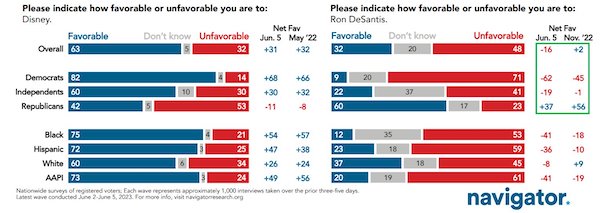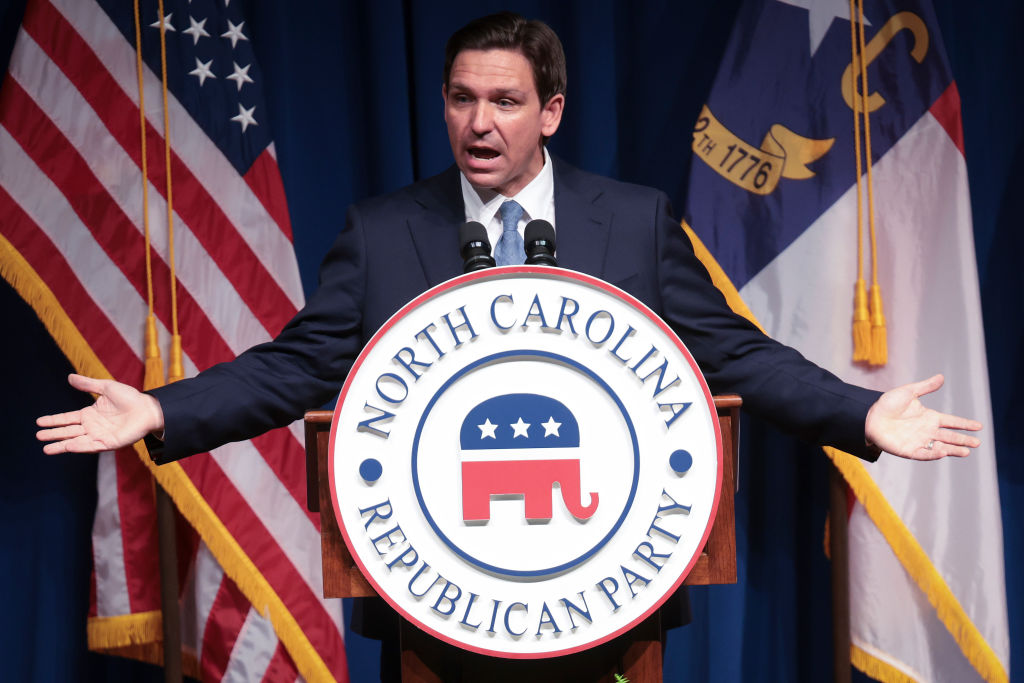Our friends the anti-anti-Trumpers like to say that if you’re not on board with Ron DeSantis in the Republican primary, you’re effectively pro-Trump.
I agree, to a point.
But I question their good faith. Backing the governor on the theory that he alone stands a chance of slaying the dragon is defensible and reflects my own position—for now. Yet the sense I get from many of them is that they’d go on backing DeSantis even if Trump quit the race tomorrow, leaving them ostensibly free to support Tim Scott, Nikki Haley, or any number of more classically liberal conservatives.
It’s not Trump’s illiberalism that offends most anti-anti-Trumpers, it seems. What offends them is that he’s bad at translating his illiberal impulses into policy, forever getting in his own way with “mean tweets,” breathtakingly stupid self-sabotage, and the occasional coup attempt.
They want a more competent authoritarian. “Trump versus DeSantis is basically radicalized Barstool conservatism versus online post-liberalism,” Vox writer Zack Beauchamp half-joked. Forgive me for not feeling emotionally invested in that choice.
But let’s humor the claim that the governor must be supported because he’s the only viable Trump challenger. My question to the anti-antis is this: What should reluctant DeSantis voters like me do as our doubts about his viability grow? At what point should we jump ship and begin looking earnestly for a candidate who really can take Trump out?
Better yet, at what point should they jump ship? If the governor drops to 10 percent in the polls while Mike Pence, say, ticks up to 18, will they insist on withholding their support from a Trump opponent who’s closer to overtaking him? “Do the anti-antis actually want to beat Trump this time?” Jonathan Last asks, harboring the same doubts I do.
If they’re not on board with the second-place candidate once DeSantis slides to third, that means they’re effectively pro-Trump, no?
We should start thinking about when it might come time to cut bait on the governor. Because while his fans won’t admit it, they know his “soft” supporters have begun to wonder. And they’re worried.
Since his campaign launched on May 24, DeSantis has run a high-energy production. He’s done many events, given interviews, and rolled out an aggressive social-media operation, as one would expect from the candidate of “online post-liberalism.” On the day of his announcement, he stood at 20.9 percent in the RealClearPolitics national average.
Twenty-three days and seven national polls later, he’s at 21.0 percent.
Trump has lost a bit of ground over the same span, falling from 54.9 percent to 52.0. But those defectors haven’t moved over to the governor, it appears; they’re sprinkled across the rest of the field and the “undecided” column. More than three weeks of spirited campaigning have produced no “DeSantis bounce.”
And he might soon fall further behind Trump as Republican backlash to the latest indictment builds. A new Harris poll published on Friday morning finds him at just 17 percent, 36 points behind Trump. That’s one of his worst showings in any survey thus far.
“The national polls don’t matter. Only Iowa matters and DeSantis is doing better in Iowa than he is nationally,” a determined supporter might say. And that’s true. If their candidate can pull off a win in the caucuses, it might trigger a tectonic shift in national polling before New Hampshire votes.
But I wouldn’t bet on it. It didn’t happen for Ted Cruz when he won Iowa in 2016. And the latest numbers from New Hampshire aren’t encouraging.
Ron DeSantis, the great anti-Trump hope, is sitting just four points ahead of the widely despised Chris Christie in New Hampshire. And before you say “outlier,” note that a second poll (conducted by the rabidly pro-Trump American Greatness site, admittedly) also finds Christie knocking on the governor’s door in that state. That one has him at seven percent, tied for third place, while DeSantis clings to second with 12 percent.
Amid trembling assurances that “it’s still early,” some DeSantis apologists on Twitter have begun to suggest ways that his campaign might right itself. The most common is to nudge the candidate of online post-liberalism to be a smidge less online and a smidge less post-liberal. Turn the dial on “anti-wokeness” down from 10 to 9, they advise, and turn the dial on kitchen-table issues way, way up.
It’s good advice but I don’t think DeSantis’ problem is that he’s talking too much about DEI and ESG and not enough about J-O-B-S. His problem is that he’s stuck in a political no-man’s land in which he’s too soft on Trump to suit anti-Trump Republicans, not soft enough on him to suit Trump-friendly populists, and too far to the right to please most of the country.
On Thursday Rolling Stone reported that Trump has begun dialing up cronies with a request: “go on TV and social media and trash Ron DeSantis for refusing to commit to pardoning” him. A Republican strategist ably explained to the magazine how that boxes in the governor: “If you blast the DOJ and you blast Jack Smith and Biden, you’re essentially defending Trump and admitting Trump was right. If you condemn him, there’s no lane for you running on that. And then silence is an equally bad option because folks notice you not saying anything.”
DeSantis’ theory of victory is to convince MAGA voters that, as president, he’ll persecute their political enemies more ruthlessly than Trump would. If he were to vouch for the Justice Department on a matter as politically sensitive as the indictment, that effort would fall to ashes. And he knows it.
DeSantis’ strategy requires him to attack Trump only on topics when he might reasonably expect populists to take his side, never when he’d reasonably expect populists to side with Trump against him. But since populists and anti-Trump Republicans are often on opposite sides of questions about Trump’s fitness for office, that leaves a lot of unmet demand on the center-right for a champion who’ll tell it like it is with respect to that unfitness.
The entry of “Kamikaze Chris” into the race and his dropping of daily truthbombs about Trump’s character makes DeSantis’ relative timidity look increasingly contemptible to anti-Trump voters, I suspect.
Which is a problem.
DeSantis needs those centrist anti-Trumpers to stick with him to have a chance at the nomination. There are more of us out here than you might suspect—not enough to overcome the GOP’s enormous Trump-friendly majority, granted, but enough to prove decisive if the governor can peel off a sizable share of populist votes from the MAGA right.
Twenty-four percent ain’t nothing. The share of Republicans who believe the federal charges against Trump are serious is even greater, currently 38 percent in the latest ABC poll and maybe on the way up. That’s a lot of GOP votes that are potentially available to DeSantis on lesser-of-two-evils grounds.
But the governor refuses to exploit those federal charges. And some members of that 38 percent cohort don’t like it.
Now that Christie has joined the campaign, someone is finally coming down hard on the guy who is 40 points ahead, reassuring the large minority of Republican voters who are troubled by Trump’s indictment that they’re not crazy to feel that way. The more bravado Christie shows in attacking Trump, the more pitiful DeSantis’ silence might seem by comparison to voters who, like me, are backing him reluctantly in the belief that he’s the only alternative capable of winning.
Christie knows it, too. He keeps mentioning that other candidates in the race who shall remain nameless won’t speak frankly about the 800-pound orange gorilla. “We’re in a situation where there are people in my own party who are blaming DOJ,” he said this week during a town hall with CNN. “How about blame [Trump?] He did it: He took documents he wasn’t supposed to take, he kept them when they asked him back for them.” Later he echoed Sununu’s point: “How do you beat someone if you don’t talk about them? How do you beat them if you won’t distinguish yourself from them?”
Populists are by no means the only voters who crave a “fighter” for their cause. If you’re a moderate Republican who regards Trump as a public menace, or even if you have mixed feelings about him yet find yourself frustrated that the candidates won’t speak candidly about how damning his indictment is, Christie’s kamikaze campaign is powerful stuff. Obscured by its shadow, DeSantis looks small.
The kamikaze campaign is also entertaining, a factor that can’t be dismissed in a party as shallow as the post-Trump GOP. “Trump is interesting and media-savvy,” Josh Barro writes. “His opponents are boring, and they want to be allowed to run boring campaigns. Do these people really believe that, if only Trump weren’t being indicted, they’d be getting invites on television to talk about ‘re-constitutionalizing the executive branch’ or whatever?” Only Christie seems to understand what defeating Trump requires, he says. Going right at the frontrunner and being theatrically combative in doing so is part of that requisite.
All of which probably explains the results of that New Hampshire poll I linked to earlier. The sharper the contrast between Christie and DeSantis in their willingness to criticize Trump, the more likely reluctant anti-Trump DeSantis voters are to bolt for Christie. And the more they bolt for Christie, the more DeSantis’ polling shrinks—which in turn undermines his claim to being the only candidate who can beat Trump, possibly triggering further defections among reluctant DeSantis voters who, deep down, prefer other people.
All of this may help explain why DeSantis’ national favorable rating has turned negative.

His average favorability at RealClearPolitics is better but still net negative at 40-44.5. A lot goes into that, no doubt—relentless attacks by Trump driving his numbers down among Republicans and a backlash among Democrats and independents to unpopular far-right policies newly enacted in Florida like the six-week abortion ban and permitless gun carry.
But the fact that DeSantis is stuck in no-man’s land, too timid in his defenses of Trump for MAGA voters and too timid in his criticisms for everyone else, also might be contributing to the decline.
At what point does that decline become so steep, and/or so protracted, that DeSantis voters decide they need to shift to an alternative who looks to have a better chance of beating Trump?
Certainly it won’t happen until he falls into a Scott-Walker-esque polling abyss in the low single digits, when even his most diehard fans will have no choice but to concede that DeSantis-mania ain’t happening. But I think that’s unlikely anytime soon for the reason I gave at the start of this column: There’s a core group of right-wingers who want an illiberal standard-bearer but don’t want Trump, and there’s only one candidate in the field who fits that bill. The governor’s polling will therefore fall only so far, at least until the moment of truth in Iowa approaches and forces a party-wide gut-check.
Most Republicans will withhold judgment on DeSantis until after the first debate or two, I suspect. Many still aren’t paying close attention to the race; they’ll tune in wanting to see what the fuss is about. A strong performance might make things interesting.
But that’s also unlikely. The governor isn’t charismatic and he’s sure to be the prime target onstage, even if Trump doesn’t attend. I’d expect him to lose votes during the debates, not gain them.
If that happens and his polling slips further, some of his reluctant conservative supporters like me will finally leave him for dead and switch to Pence or Tim Scott or whoever. But the 10 percent or so of the party that’s truly Ready for Ron won’t go quietly. They’ll be pushing him deep into the winter even if he’s slipped to third place.
He is, after all, the only non-Trump candidate with a theory of how to build a winning coalition. If the national polling at Thanksgiving shows Trump at 45 percent, Pence at 25 percent, and DeSantis at 15 percent, DeSantis enthusiasts will call on Pence to quit the race because he has no way to realistically consolidate the 55 percent non-Trump majority. He’s anathema to populists, and no one’s winning the Republican nomination without meaningful populist support.
Scott won’t contend for the populist vote either. Neither will Haley or Christie or any other establishment Republican from the Before Times. To beat Trump, the governor’s fans will insist, one must accept that only a candidate who built a base of populist support during the After Times can do it. Uniting behind DeSantis the way the Democratic field united behind Joe Biden before Super Tuesday in 2020 is the only option.
When that argument falls on deaf ears, as it almost certainly will, DeSantis fans might finally, finally accept that the great cause is lost. But if they do, they’re not switching to Pence in order to build the sort of anti-Trump coalition that they keep demanding traditional conservatives join them in building. They’re switching to Trump. Better to have an imperfect vessel for illiberalism leading the party than elevate a man who refused to abet a coup attempt that would have fully and finally owned the libs.
Voting for Trump is what anti-anti-Trumpers always do in the end, traditionally. Why would next time be any different?
But all of this is in the far future. Until then, I encourage you to sit back and enjoy the genital-themed insults and mafia-style indifference to felony convictions that now defines this excellent party filled with excellent people. Rest assured that, however this primary goes, it’ll end up nominating a person perfectly commensurate with its own character.









Please note that we at The Dispatch hold ourselves, our work, and our commenters to a higher standard than other places on the internet. We welcome comments that foster genuine debate or discussion—including comments critical of us or our work—but responses that include ad hominem attacks on fellow Dispatch members or are intended to stoke fear and anger may be moderated.
You are currently using a limited time guest pass and do not have access to commenting. Consider subscribing to join the conversation.
With your membership, you only have the ability to comment on The Morning Dispatch articles. Consider upgrading to join the conversation everywhere.